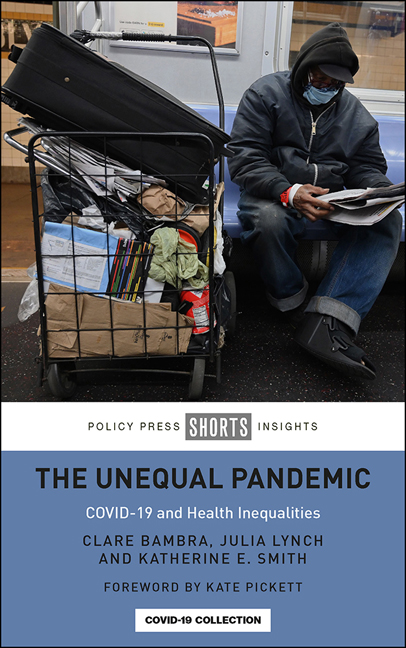Book contents
- Frontmatter
- Contents
- List of figures and tables
- About the authors
- Acknowledgements
- Foreword
- Preface
- one Introduction: perfect storm
- two Pale rider: pandemic inequalities
- three Collateral damage: inequalities in the lockdown
- four Pandemic precarity: inequalities in the economic crisis
- five Pandemic politics: inequality through public policy
- six Conclusion: health and inequality beyond COVID-19
- Notes
- References
- Index
one - Introduction: perfect storm
Published online by Cambridge University Press: 04 January 2022
- Frontmatter
- Contents
- List of figures and tables
- About the authors
- Acknowledgements
- Foreword
- Preface
- one Introduction: perfect storm
- two Pale rider: pandemic inequalities
- three Collateral damage: inequalities in the lockdown
- four Pandemic precarity: inequalities in the economic crisis
- five Pandemic politics: inequality through public policy
- six Conclusion: health and inequality beyond COVID-19
- Notes
- References
- Index
Summary
Perfect storm: a particularly violent storm arising from a rare combination of negative factors.
COVID-19: the unequal pandemic
In December 2019, the first cases of an unusual ‘pneumonia’ were documented in the Chinese city of Wuhan. The novel disease, which seems to have jumped from an animal population into humans, was later named ‘SARS-CoV-2’ or ‘COVID-19’ (coronavirus disease 2019). The entire city of Wuhan, with a population over 11 million, was put under stringent quarantine by the Chinese government, with the lockdown eventually lasting 76 days. But by January 2020, the disease had spread to the US, Europe and the UK, and at the end of the month the World Health Organization (WHO) declared COVID-19 a ‘public health emergency of international concern’. By February, the first death attributed to coronavirus was reported outside of China, in the Philippines, and France announced the first coronavirus death in Europe. By the end of February, COVID-19 cases had been reported across all world regions and by mid-March, the epicenter of the COVID-19 pandemic had moved from China to Europe. By the end of March countries as varied as the UK, India, France and Norway had introduced emergency measures (social distancing and lockdowns) to try and contain the virus. The COVID-19 pandemic had begun.
COVID-19 is now a global phenomenon, affecting all parts of the world and all parts of society, radically altering how we live and interact. Everyone, from all walks of life, has been affected by the pandemic. But, as this book will show, some people have been – and will be – far more affected than others: COVID-19 is an unequal pandemic.
High-profile early cases of the virus included powerful and wealthy individuals such as Prince Charles, UK prime minister Boris Johnson, and Hollywood actor Tom Hanks. This gave the impression, often reinforced in claims made by politicians and the media, that when it came to COVID-19 we are ‘all in it together’, and that the COVID-19 virus ‘does not discriminate’. In one sense, this is true: the virus, once contracted, can bring serious illness or death no matter how wealthy or powerful the ‘host’.
- Type
- Chapter
- Information
- The Unequal PandemicCOVID-19 and Health Inequalities, pp. 1 - 12Publisher: Bristol University PressPrint publication year: 2021



